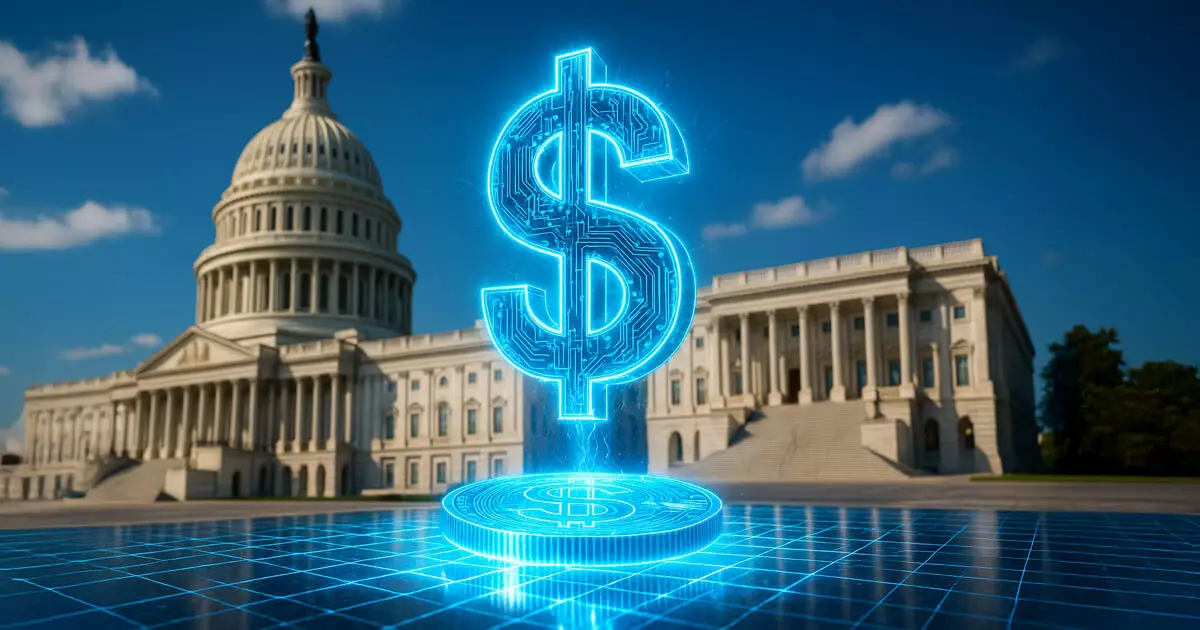The Senate Republicans’ drive for expedited consideration of the GENIUS Act represents a significant evolution in the regulatory treatment of digital assets. With a tentative vote scheduled before Memorial Day, it is clear that the urgency of regulation is being propelled by the rapid expansion of stablecoins—a sector that, as of now, boasts a capitalization exceeding $241 billion. While this push for regulation is undoubtedly necessary to maintain oversight and consumer protection in an increasingly digital economy, it raises serious questions regarding the balance between innovation and regulation. Are lawmakers genuinely equipped to navigate this complex landscape, or are they merely playing catch-up in an arena that evolves faster than bureaucratic processes can manage?
Defending Dollar Primacy Amid Global Competition
At the heart of the GENIUS Act lies a desire to solidify the U.S. dollar’s position in an increasingly competitive global economy. Supporters, including Senators Bill Hagerty, Cynthia Lummis, and Tim Scott, argue that bringing stablecoins under stricter regulatory environments will preserve dollar dominance and create a level playing field for both established and emerging players in the field of digital assets. There is no denying that maintaining U.S. monetary influence is crucial, particularly as countries like China experiment with their central bank digital currencies (CBDCs). However, this concern should not overshadow the potential for stifling innovation and limiting opportunities for American entrepreneurs who seek to revolutionize finance through technology.
Constructive Regulations or Overreaching Control?
The proposed GENIUS Act sets forth a framework mandating that stablecoins maintain a 1:1 backing in cash or Treasuries. This requirement is designed to instill consumer confidence, yet it raises the issue of whether it will inadvertently reduce the innovative potential of stablecoin projects that do not fit neatly into this regulatory model. Critics such as Senator Elizabeth Warren and various banking coalitions express fears that the act could pave the way for oligopolistic practices within the stablecoin market, effectively sidelining smaller players and solidifying control in the hands of a few titans. Legislative attempts at regulation must ensure they do not choke innovation with heavy-handed restrictions that favor large incumbents.
Partisan Divisions: A Double-Headed Coin
The GENIUS Act also spotlights the profound partisan divides that define the current political landscape. While the Senate Banking Committee showed a commendable degree of bipartisanship in passing the bill by an 18-6 margin, the path to a vote in the full chamber remains fraught with challenges. Democrats are split, with some expressing cautious optimism while others, like Warren, vehemently oppose any form of expansive regulation in this space. This fragmentation could jeopardize the bill’s chance of securing the necessary votes. The questions of consumer protection and financial stability put forward by progressives resonate strongly in the current climate. However, stringent regulatory conditions could suppress the innovation that a healthy marketplace thrives upon.
Are They Really Ready for This?
One of the most significant concerns surrounding the GENIUS Act is whether lawmakers are genuinely prepared to take meaningful action on stablecoins. Federal Reserve Governor Christopher Waller has voiced support for a collaborative regulatory approach for both banks and non-banks to issue tokens, but this comes with its own complications. The imperative to create a cohesive, nationwide framework could prove elusive if policymakers cannot align differing opinions within their own parties. As Congress prepares for an important vote, one must ask: are lawmakers equipped with a thorough understanding of what is at stake? The rapidly evolving nature of cryptocurrencies and blockchain technology demands a nuanced approach; oversimplification will only lead to inadequate regulations.
The Broader Implications of Digital Currency
The fate of the GENIUS Act holds broader implications beyond stablecoins themselves. It strikes at the core of how digital currency will be integrated into the American financial system and what role individuals and corporations will play in shaping that future. Are we comfortable placing significant portions of our financial lives into the hands of the government while allowing large corporations to wield immense influence over our currency? Immediate legislative action is essential, but what must accompany it is transparency, education, and public dialogue—elements often overlooked in rapid-fire decision-making processes.
The ongoing debate regarding the GENIUS stablecoin bill is not merely a political discussion; it embodies the intricate ballet of technology, finance, consumer protection, and international competitiveness. As this narrative unfolds, it could either fall into a well-structured framework propelling American innovation— or result in an overreaching regime that stifles the very progress it aims to regulate. The stakes are high and the decisions made in the coming weeks will undoubtedly reverberate for years to come.

